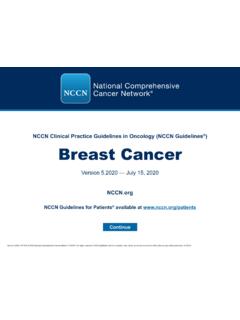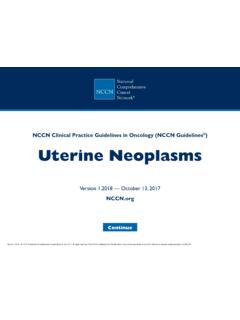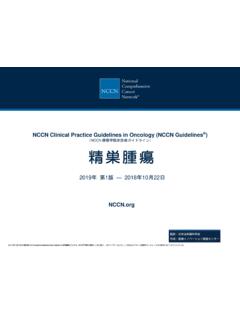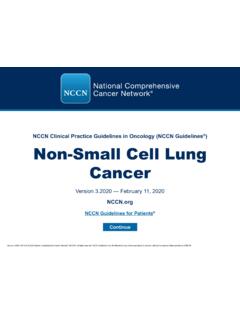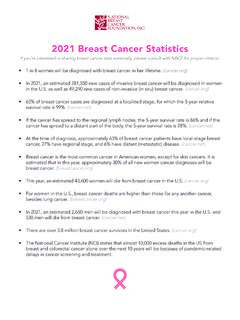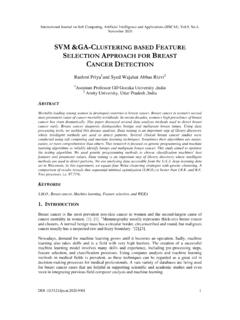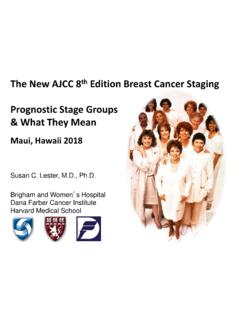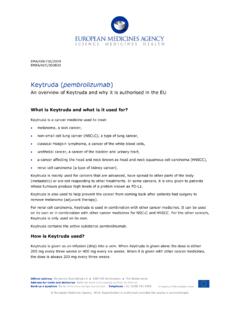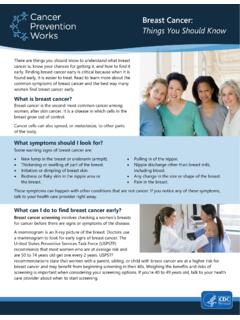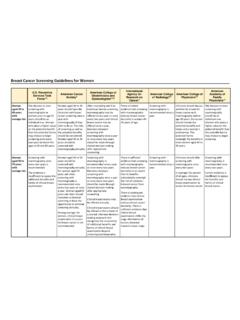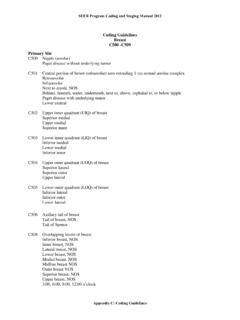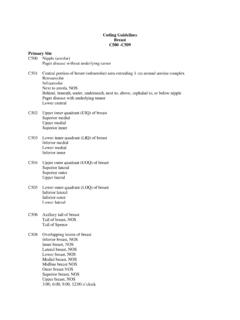Transcription of NCCN Clinical Practice Guidelines in Oncology NCCN ...
1 , 01/18/19 2019 National Comprehensive cancer Network (NCCN ), All rights reserved. NCCN Guidelines and this illustration may not be reproduced in any form without the express written permission of Clinical Practice Guidelines in Oncology (NCCN Guidelines )Genetic/Familial High-Risk Assessment: breast and OvarianVersion January 18, 2019 ContinueContinueNCCN Guidelines Panel Disclosures Medical Oncology cancer /Medical genetics Internal medicine Hematology/Hematology Oncology Gynecologic Oncology /Gynecology breast surgical Oncology & Public health and preventive medicine Patient advocacy*Discussion Writing Committee Member*Mary B.
2 Daly, MD, PhD/Chair Fox Chase cancer Center*Robert Pilarski, MS, CGC/Vice-chair The Ohio State University Comprehensive cancer Center - James cancer Hospital and Solove Research InstituteMichael P. Berry, MD St. Jude Children s Research Hospital/ The University of Tennessee Health Science CenterSaundra S. Buys, MD Huntsman cancer Institute at the University of UtahSusan Friedman, DVM FORCE: Facing Our Risk of cancer EmpoweredJudy E. Garber, MD, MPH Dana-Farber/Brigham and Women s cancer Center Mollie L. Hutton, MS, CGC Roswell Park cancer InstituteNoah D.
3 Kauff, MD Duke cancer InstituteSeema Khan, MD Robert H. Lurie Comprehensive cancer Center of Northwestern UniversityCatherine Klein, MD University of Colorado cancer CenterWendy Kohlmann, MS, CGC Huntsman cancer Institute at the University of UtahAllison W. Kurian, MD, MSc Stanford cancer InstituteChristine Laronga, MD Moffitt cancer CenterJennifer K. Litton, MD The University of Texas MD Anderson cancer CenterLisa Madlensky, PhD, CGC UC San Diego Moores cancer CenterJulie S. Mak, MS, MSc, CGC UCSF Helen Diller Family Comprehensive cancer CenterSofia D.
4 Merajver, MD, PhD University of Michigan Rogel cancer CenterKenneth Offit, MD Memorial Sloan Kettering cancer CenterTuya Pal, MD Vanderbilt-Ingram cancer CenterHolly J. Pederson, MD Case Comprehensive cancer Center/University Hospitals Seidman cancer Center and Cleveland Clinic Taussig cancer InstituteGwen Reiser, MS, CGC Fred & Pamela Buffett cancer CenterKristen Mahoney Shannon, MS, CGC Massachusetts General Hospital cancer CenterPremal Thaker, MD Siteman cancer Center at Barnes- Jewish Hospital and Washington University School of MedicineKala Visvanathan, MD, MHS The Sidney Kimmel Comprehensive cancer Center at Johns HopkinsJeffrey N.
5 Weitzel, MD City of Hope Comprehensive cancer CenterMyra J. Wick, MD, PhD Mayo Clinic cancer CenterKari B. Wisinski, MD University of Wisconsin Carbone cancer CenterNCCN Susan Darlow, PhDMary Dwyer, MSNCCN Guidelines Version High-Risk Assessment: breast and OvarianVersion , 01/18/19 2019 National Comprehensive cancer Network (NCCN ), All rights reserved. NCCN Guidelines and this illustration may not be reproduced in any form without the express written permission of Guidelines IndexTable of ContentsDiscussionClinical Trials: NCCN believes that the best management for any patient with cancer is in a Clinical trial.
6 Participation in Clinical trials is especially encouraged. To find Clinical trials online at NCCN Member Institutions, click Categories of Evidence and Consensus: All recommendations are category 2A unless otherwise indicated. See NCCN Categories of Evidence and Genetic/Familial High-Risk Assessment Panel MembersSummary of the Guidelines UpdatesBreast and/or Ovarian cancer Genetic Assessment (BR/OV-1)BRCA-Related breast and/or Ovarian cancer Syndrome (BRCA-1)BRCA Mutation-Positive Management (BRCA-A)Li-Fraumeni Syndrome (LIFR-1)Li-Fraumeni Syndrome Management in Adults (LIFR-A)Cowden Syndrome/PTEN Hamartoma Tumor Syndrome (COWD-1)Cowden Syndrome/PHTS Management (COWD-A)Multi-Gene Testing (GENE-1)
7 The NCCN Guidelines are a statement of evidence and consensus of the authors regarding their views of currently accepted approaches to treatment. Any clinician seeking to apply or consult the NCCN Guidelines is expected to use independent medical judgment in the context of individual Clinical circumstances to determine any patient s care or treatment. The National Comprehensive cancer Network (NCCN ) makes no representations or warranties of any kind regarding their content, use or application and disclaims any responsibility for their application or use in any way. The NCCN Guidelines are copyrighted by National Comprehensive cancer Network.
8 All rights reserved. The NCCN Guidelines and the illustrations herein may not be reproduced in any form without the express written permission of NCCN. Guidelines Version High-Risk Assessment: breast and OvarianVersion , 01/18/19 2019 National Comprehensive cancer Network (NCCN ), All rights reserved. NCCN Guidelines and this illustration may not be reproduced in any form without the express written permission of Guidelines IndexTable of ContentsDiscussionGlobal "Mutation" was changed to "pathogenic/likely pathogenic variant" throughout the Guidelines . breast and Ovarian cancer Genetic AssessmentBR/OV-1 Criteria for Further Genetic Risk Evaluation The criteria were extensively revised and reorganized.
9 The following footnotes were added: Footnote b, "Irrespective of degree of relatedness." Footnote d, "Metastatic prostate cancer is biopsy-proven and/or with radiographic evidence and includes distant metastasis and regional bed or nodes. It is not a biochemical recurrence." Footnote g, "When possible, genetic testing should be performed first on an affected family member." The following footnotes were removed: "For populations at increased risk due to founder mutations, requirements for inclusion may be modified." "For lobular breast cancer with a family history of diffuse gastric cancer , CDH1 gene testing should be considered.
10 " "For hamartomatous colon polyps in conjunction with breast cancer and hyperpigmented macules of the lips and oral mucosa, STK11 testing should be considered. See NCCN Guidelines for Genetic/Familial High-Risk Assessment: Colorectal Peutz-Jeghers syndrome. Melanoma has been reported in some BRCA-related families."BR/OV-A 1 of 3 Genetic Testing Considerations 4th bullet, 2nd sentence was added, It is encouraged that testing be done in commercial or academic labs that are clinically approved and validated."Updates in Version of the NCCN Guidelines for Genetic/Familial High-Risk Assessment: breast and Ovarian from Version include:BRCA-1 BRCA1/2 Testing Criteria The criteria were extensively revised and reorganized.
